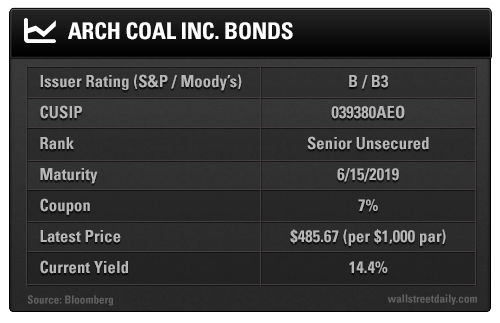As long as there’s been debt, a way to resolve unpayable debt has needed to exist.
A passage from Deuteronomy in the Bible talks about creditors canceling debts every seven years.
Throughout 19th century Europe, those unable to pay their obligations would likely wind up in debtor’s prison, where they remained until their families paid their liabilities.
And today, bankruptcy laws help people who can no longer pay their debts get a fresh start.
Even in the corporate world, bankruptcy can help companies liquidate or reorganize.
For the past few years, though, bankruptcies haven’t been much of a concern. In fact, U.S. corporate default rates have remained low for an extended period of time.
But recently, there are pockets of distress, and I believe that acute bankruptcy fears are creating an enormous opportunity within one long-suffering industry.
The Perfect Storm
That struggling industry is U.S. coal.
Coal mining companies have been plagued by tighter environmental regulations and a shale boom that has made natural gas more competitive.
A decrease in Chinese demand for metallurgical coal, which is used to produce steel, hasn’t helped either.
In fact, two of the smaller coal producers, Patriot Coal Corp. and James River Coal Co., have already filed for bankruptcy.
And with coal prices now hitting lows not seen in over five years, the bond market is expecting more bankruptcies.
All of these factors have combined to form a perfect storm for the coal industry.
Consequently, bonds issued by coal companies are beginning to price in significantly higher default probabilities.
For example, Walter Energy's (NYSE:WLT) 9.875% coupon bonds due in 2020 have collapsed from a price of above $900 all the way down to around $320 per $1,000 par value. Investors who bought these bonds closer to par weren’t mindful of the macro risks involved (yes, fixed-income investors still need to maintain a macro perspective).
At this point, we’re seeing bona fide fear in the market for coal bonds. It’s reminiscent of 2008 and 2009, when virtually the entire high-yield bond market resembled the current situation in coal bonds.
Yet I believe there’s an opportunity amidst all of the panic.
Even though more coal companies will need to restructure their debts, the industry itself certainly isn’t going away anytime soon. In 2013, coal accounted for nearly 40% of electricity generation in the United States.
And while the beleaguered coal industry is in the process of idling mines – which is painful for the companies and their workers – these actions will ultimately reduce supply and help stabilize coal prices going forward.
High Yield While You Wait
Unlike the majority of the “high”-yield bond market, coal bonds are trading with massive yields.
But the aforementioned Walter Energy is in a very weak position, so it’s best to look elsewhere.
Arch Coal (NYSE:ACI), for example, is in a slightly more favorable credit condition and is rated B/B3 (S&P/Moody’s).
You’ll often see bond yields quoted as yield to maturity, which assumes the bond principal will be repaid in full. However, in order to properly assess the risk of these high-yield bonds, we have to assume some type of credit event. In other words, the bond’s principle won’t be paid in full, and we should look at the current yield, which is the coupon dividend by the current bond price.
Arch Coal’s senior unsecured bonds maturing in 2019 have a current yield of 14.4%.

The ill-timed acquisition of International Coal Group in 2011 left Arch laden with debt and more exposed to declining coal prices.
But the company still has $989 billion in cash and cash equivalents on its balance sheet. Management is aggressively trying to control costs, which should help to mitigate the company’s cash-burn rate.
So, you’ll get paid a 13.5% current yield while you wait for either an upturn in coal prices or some type of credit event.
Based on the fact that the bonds are now trading around $0.50 on the dollar, I believe that Arch Coal’s senior unsecured bonds offer an attractive risk-reward dynamic, as long as position sizes are kept small.
Remember: High-yield bonds (which we’ve been warning about all year) are one asset class category within the fixed-income asset class. And fixed income is just one asset class within a diversified portfolio.
Buying individual corporate bonds certainly isn’t for everyone, either. Fixed-income securities are more complex than equities, and analyzing potential bankruptcy outcomes is particularly challenging. You also may have to call your broker’s corporate bond desk to get a quote or make a transaction.
If you’d rather not enter the arena with distressed debt hedge funds, then you can own a professionally managed closed-end bond fund.
Safe (and high-yield) investing,
BY Alan Gula, CFA
